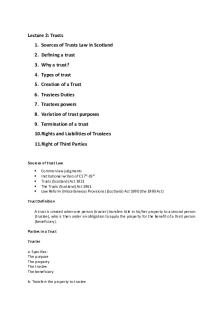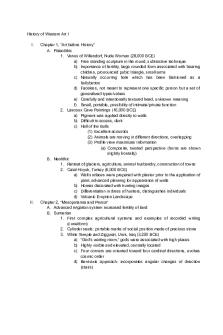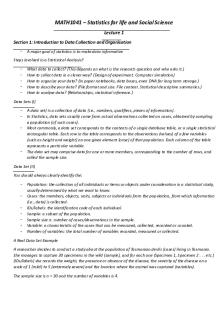PSYC123 notes PDF

| Title | PSYC123 notes |
|---|---|
| Course | Theory Design and Statistics in Psychology |
| Institution | University of Wollongong |
| Pages | 5 |
| File Size | 196.4 KB |
| File Type | |
| Total Downloads | 47 |
| Total Views | 120 |
Summary
some notes made in lectures...
Description
PSYC12 3
Research Two foundations
Ontological questions: o How you experience things o Subjective and personal o “What can I know about?” Epistemological questions: o What is knowledge? o How is it generated and transmitted? o “How can I gain knowledge?”
Ways of knowing:
Non-empirical o Authority o Logic Empirical: Based on experience o Intuition o Science
Non-empirical methods are based on
Authority: based on someone else knowledge Logic: Following patterns of logic based on inductive or deductive reasoning, cannot be a substitute for empirical evidence
Empirical methods are based on:
Intuition: Spontaneous, instinctive way of knowing, not based on reasoned mental steps o Common sense is a form of intuition: practical intelligence shared by a large group of people with shared attitudes and experiences. Has its limitations: Changes with time and circumstance (cultural differences, historic) Pragmatic: dealing with things sensibly and realistically based on practicality instead of theory Can’t predict new knowledge Science: Obtaining knowledge through objective observations
Characteristics of science:
Empirical: relying on experience, data collection Objective: the same evidence would be found by two different people Self correcting: willingness to let new evidence correct previous beliefs and a commitment to change based on empirical evidence, actively seeking to address own errors Progressive: moves foreward with truth, adding more information to what was previously known, comes closer to its goals over time Tentative: science never claims to have the whole truth, new information can make old knowledge obsolete at any time, all theories are falsifiable Parsimonious: seeks simplest, valid explanation Concerned with theory: development of theory and understanding of how things work
Assumptions of science
Reality of world: Realism, philosophy that objects have and existence outside of mind Rationality: Reasoning is the basis for solving problems, the world is understandable with logical thinking, obey laws of logic Regularity: Phenomena exists in recurring patters that conform with universal laws Discoverability: It is possible to learn solutions to questions Causality: every event has a cause, Determinism: all events happen because of preceding causes. o Temporal precedence o Co-variation of cause & effect o Probabilistic co-variation
Goals of science
Understanding the world through: o Discovering regularities: Description: describing and defining the important phenomena Discovering laws: definition of law: statement that certain events are regularly associated with each other in an orderly way Search for cause: search for cause of events that we observe o Developing theories: via explanations that organise and explain laws and predict new laws o Ultimate goal is to explain lawful relationships in certain areas o Theory defined: set of statements that organise a large body of laws into a single explanatory system o Theories much be falsifiable: capable of being untrue
Issues of science
Background influences o Values, beliefs and attitudes influences what you think, and therefore what you find Observing can change behaviour: needs to be as natural and controlled as possible
Equipment can change results
Research methods
Samples Procedures for observations o Manipulating o Observing o Comparing o Measuring Two main decisions: o Research design: how are we going to test the hypothesis Quantitative: measuring statistics and numbers Experimental Non-experimental Qualitative: Asks about behaviour and experiences o Sampling: who are our participants
Theory
Frames the way we come to know things and work with concepts Sets up assumptions about concepts and phenomenon Helps to communicate and understand phenomenon Advances knowledge by allowing theories to be tested Theories drive everything: hypothesis, method, type of data, everything Theories can be o Inductive Bottom up Qualitative Observation> Interpretation> Hypothesis> Theory o Deductive o Top down o Quantitative o Theory> Hypothesis> Observation> Interpretation Theories tell us o What and how to observe and measure o Help us to problem solve What to manipulate How to manipulate
Role of theories
Organising knowledge and explaining laws Predicting new laws
Guiding research: suggests new experiments, helps researchers choose alternative ways of performing them Other goals o Description o Prediction: Knowledge of laws allows us to predict occurrences of behaviour o Control: If we are able to predict behaviours, we are then able to control them
Defining theoretical concepts
Definition: description with the purpose of making meaning clear Conceptual definition: abstract subjects Operational definition: a statement of the precise meaning of a procedure or concept
Phases of research...
Similar Free PDFs
Popular Institutions
- Tinajero National High School - Annex
- Politeknik Caltex Riau
- Yokohama City University
- SGT University
- University of Al-Qadisiyah
- Divine Word College of Vigan
- Techniek College Rotterdam
- Universidade de Santiago
- Universiti Teknologi MARA Cawangan Johor Kampus Pasir Gudang
- Poltekkes Kemenkes Yogyakarta
- Baguio City National High School
- Colegio san marcos
- preparatoria uno
- Centro de Bachillerato Tecnológico Industrial y de Servicios No. 107
- Dalian Maritime University
- Quang Trung Secondary School
- Colegio Tecnológico en Informática
- Corporación Regional de Educación Superior
- Grupo CEDVA
- Dar Al Uloom University
- Centro de Estudios Preuniversitarios de la Universidad Nacional de Ingeniería
- 上智大学
- Aakash International School, Nuna Majara
- San Felipe Neri Catholic School
- Kang Chiao International School - New Taipei City
- Misamis Occidental National High School
- Institución Educativa Escuela Normal Juan Ladrilleros
- Kolehiyo ng Pantukan
- Batanes State College
- Instituto Continental
- Sekolah Menengah Kejuruan Kesehatan Kaltara (Tarakan)
- Colegio de La Inmaculada Concepcion - Cebu















